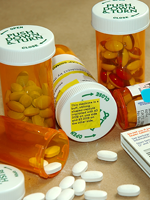Boston, MA—It is well-recognized that radiation-induced symptoms can be extremely severe for patients with head and neck cancer. Although “magic mouthwash” (ie, diphenhydramine plus lidocaine plus antacid [DLA]) is frequently used for the treatment of oral mucositis associated with radiotherapy to the head and neck, until now there has been no solid evidence for this approach. The results of a new study by Robert C. Miller, MD, Mayo Clinic, Jacksonville, FL, and colleagues, showed that magic mouthwash is superior to placebo. The study also showed that a doxepin rinse was superior to placebo and as effective as magic mouthwash.
Although both approaches achieved significant reductions in radiation-related oral mucositis pain compared with placebo, the study did not directly compare the doxepin and the magic mouthwashes. Dr Miller presented the study results at the 2016 annual meeting of the American Society for Radiation Oncology (ASTRO).
“This is the first good evidence from a randomized trial to show that magic mouthwash is effective. We previously showed in a phase 1 trial that doxepin mouthwash was effective. Now patients have 2 options for relief of pain associated with oral mucositis,” said Dr Miller, who conducts trials through the Alliance for Clinical Trials in Oncology cooperative group that evaluates medications for radiation-induced symptoms.
Magic mouthwash encompasses a variety of lidocaine-based oral rinses. For this multi-institution, randomized, double-blind, placebo-controlled, 3-arm phase 3 clinical trial, a one-time rinse-and-spit preparation of doxepin mouthwash (25 mg in 5 mL of water) or DLA was compared with placebo.
The study enrolled 275 patients who received definitive head and neck radiation therapy (>45 Gy) and had oral mucositis pain >4 on a scale of 0 to 10 on a patient-reported analog pain questionnaire given at baseline and at intervals up to 4 hours after the rinse. Of the 275 patients enrolled, 228 patients were evaluable for total reduction in oral mucositis pain (the primary end point) as measured by the area under the curve (AUC) of the pain scale >4 hours after a single dose of the rinse.
After completing the study, patients were given the option of continuing the study drug to which they had been assigned.
The doxepin mouthwash and the DLA mouthwash were significantly superior to placebo in achieving mean AUC reduction in pain. For the doxepin versus placebo comparison, the mean AUC reduction in pain was 11.9 versus 8.7, respectively (P = .01) and for the DLA versus placebo comparison, the mean AUC reduction in pain was 11.7 versus 8.7, respectively (P = .004).
Time, treatment arm, age, and mucous membrane scores had significant effects on pain scores. Compared with placebo, the doxepin mouthwash arm achieved significantly less mouth pain at 30 minutes and 60 minutes compared with placebo (P = .03). The DLA arm achieved significantly less mouth pain at 5 minutes (P = .01), 15 minutes (P = .003), and 30 minutes (P = .004) compared with placebo.
Patients using the doxepin mouthwash reported more drowsiness at 30 and 60 minutes, as well as significantly more fatigue (P = .03) compared with placebo; this was not reported in the DLA mouthwash arm. There were no other differences in adverse events between the 2 arms. The percentage of patients who required additional analgesics at 4 hours was similar for the 2 active mouthwashes—15% of patients who used the doxepin mouthwash, and 19% of those who used the DLA mouthwash. In the placebo arm, 28% of patients used additional analgesics at 4 hours after the rinse.
“This is an encouraging study providing the first solid evidence that magic mouthwash works,” said Benjamin Moses, MD, Henry Ford Hospital, Detroit, MI, and moderator of the session where this study was presented.
“The costs of the 2 mouthwash preparations is a consideration in choosing which one to use. Also, we need to learn more about the fatigue and drowsiness associated with the doxepin mouthwash in some patients,” said Dr Moses.


